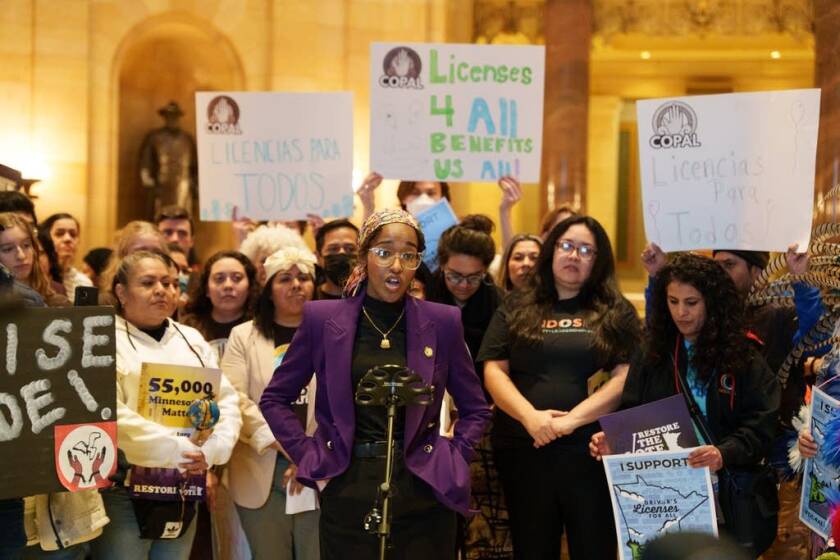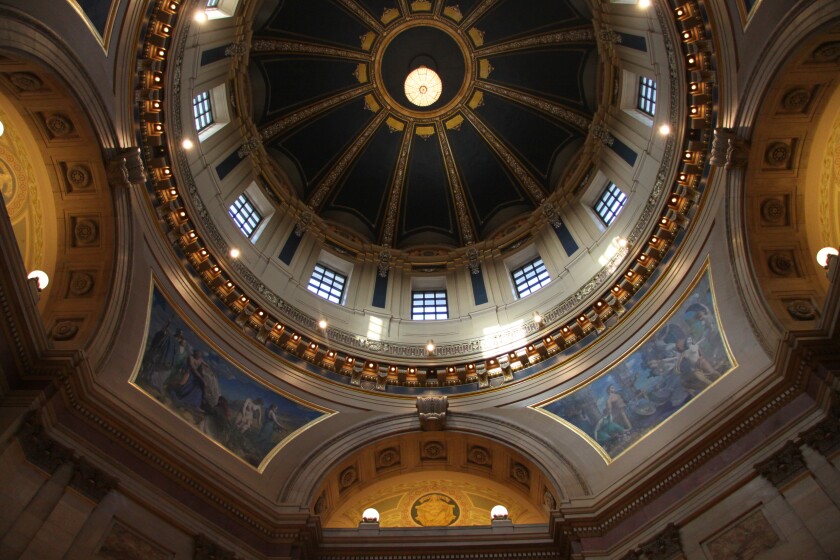ST. PAUL — As part of a broader public safety bill passed by the Minnesota Legislature this year, the state will soon start collecting reports of discrimination from community groups in what backers say is an effort to keep better track of civil rights trends.
Democratic-Farmer-Labor backers say closer tracking of bias incidents that do not always rise to the level of a crime is key to tackling discrimination in the state, especially amid a recent rise in reports of vandalism and violence against Asian Americans and Muslims in Minnesota. They also say people from marginalized groups, such as ethnic minorities or the LGBT community, are likelier to share incidents with community groups rather than the police.
ADVERTISEMENT
In a recent interview, Sen. Zaynab Mohamed, a Minneapolis DFLer who carried the bill in the Senate, pointed to two fires at Minneapolis mosques and a COVID-era surge in reports of discrimination against Asian Americans as reasons for the tracking.
“If we don't see what's happening, we will not be able to do anything about it,” Mohamed said. "These communities will continue to be attacked. And there will be no one stepping up to do something about it because we just haven't named the issue."

The new law directs the Minnesota Department of Human Rights to track information from community organizations representing historically marginalized groups, analyze civil rights trends, and compile findings into a report to share with lawmakers in 2025. Officials will compile past and future incidents like “fires at mosques, swastikas painted on property, and Nazi salutes occurring at school events,” according to department spokesman Taylor Putz.
The department will have to produce a report on bias trends over the next two years and deliver it to state lawmakers by Feb. 1, 2025. The public safety bill appropriates $645,000 for the “Report on Civil Rights Trends."
But many may have heard the bill presented in a very different light as it moved through the Legislature this spring, when GOP critics questioned the reliability of reporting and implications for free speech. An earlier version of the bill specifically allowed people to directly call the Department of Human Rights to report incidents, language that did not make it into the bill's final version.
During House debate, Republican opponents characterized the proposal as calling for the creation of a “bias incidents database” which would track reports of discrimination that would not rise to the level of a criminal offense. They painted the bill as an “Orwellian” push to track objectionable speech, and questioned whether the information collected by state officials would be properly vetted. Rep. Walter Hudson, R-Albertville, called it a "thoughtcrime" database.

Publications such as the Daily Mail, New York Post and conservative magazine National Review published reports on the debate and bill using this characterization.
ADVERTISEMENT
The key moment that caught the most attention? An exchange during a floor debate when Rep. Harry Niska, R-Ramsey, asked House bill sponsor Rep. Samantha Vang, DFL-Brooklyn Center, if publishing an article on the theory that COVID-19 was a bioweapon that had originated in a Chinese laboratory could count as a bias incident under the new legislation.
Vang said it would be possible.
“With the rhetoric we have seen since the pandemic regarding accusing Asians of bringing in the coronavirus, that is bias-motivated,” the first-term representative said. “So that can be considered a bias incident.”

Niska also asked if wearing a shirt supporting Harry Potter author J.K. Rowling would count as a bias incident, as Rowling has expressed critical views of transgender people. Vang said it would depend on the situation's context and would be a better question for an attorney.
Asked by Forum News Service whether spreading a lab theory on COVID would count as a bias incident, Sen. Mohamed said she trusted the judgment of Human Rights Department officials.
“Could that happen? Sure, maybe,” she said, but added: “They know exactly what they're doing. They understand the goal of what this legislation is supposed to do.”
Asked the same question, Putz with the Department of Human Rights said the House debate centered around “old language” that is not in the final version of the bill that became law.
ADVERTISEMENT
The bill's final version is narrower than the original proposal, and it's still unclear what specific information the report from the human rights department will contain.
In the original proposal, the bill called for the department to "solicit, receive, and compile information from community organizations, school districts and charter schools, and individuals regarding incidents committed in whole or in substantial part because of the victim's or another's actual or perceived race, color, ethnicity, religion, sex, gender, sexual orientation, gender identity, gender expression, age, (or) national origin."
In its final form as a law, language calls for the department to “analyze civil rights trends ... including information compiled from community organizations that work directly with historically marginalized communities."
So the report will track incidents and monitor trends, but officials haven’t decided exactly how they’ll do that, Putz said.
“It's still too early to know exactly all of the information that we'll be collecting,” he explained. “Whatever information is collected, it will provide a robust understanding of what is happening in Minnesota communities.”
What officials do know right now is community organizations such as Jewish Community Action, the Coalition of Asian American Leaders, and the Jewish Community Relations Council of Minnesota and the Dakotas, will provide reports of bias incidents to the state.
Another concern critics raised about the bias report is that it could be subject to abuse by groups who stand to benefit from inflating the frequency of bias incidents. The legislation does not call for any specific vetting procedures for reporting, some Republicans said, meaning false data could end up in a report on trends.
ADVERTISEMENT
Asked about this concern, Putz said it would have been more of a problem if the human rights department were to take direct reports of discrimination from individuals. With nonprofits and other groups with a track record of documenting discrimination being the source of information, that won’t be a concern, he said.
Still, even with the changes, GOP critics are not convinced. Niska in a May statement on the public safety bill said changes to the bias incidents tracking language still achieve the same goal.
“They are pretending to fix the speech registry but are still funding it while using more vague language that refers to analyzing civil rights trends,” Niska said. “They are embarrassed because they can’t publicly defend their plan to create a new state-funded branch of thought police, so they have resorted to using misleading euphemisms while gaslighting the public.”
Follow Alex Derosier on Twitter or email aderosier@forumcomm.com .
















